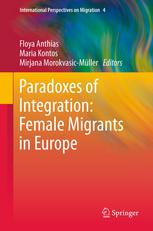

Most ebook files are in PDF format, so you can easily read them using various software such as Foxit Reader or directly on the Google Chrome browser.
Some ebook files are released by publishers in other formats such as .awz, .mobi, .epub, .fb2, etc. You may need to install specific software to read these formats on mobile/PC, such as Calibre.
Please read the tutorial at this link: https://ebookbell.com/faq
We offer FREE conversion to the popular formats you request; however, this may take some time. Therefore, right after payment, please email us, and we will try to provide the service as quickly as possible.
For some exceptional file formats or broken links (if any), please refrain from opening any disputes. Instead, email us first, and we will try to assist within a maximum of 6 hours.
EbookBell Team

4.8
44 reviewsThis timely and innovative book analyses the lives of new female migrants in the EU with a focus on the labour market, domestic work, care work and prostitution in particular. It provides a comparative analysis embracing eleven European countries from Northern (UK, Germany, Sweden, France), Southern (Portugal, Spain, Italy, Greece, Cyprus) and Eastern Europe (Poland, Slovenia), i.e. old and new immigration countries as well as old and new market economies. It maps labour market trends, welfare policies, migration laws, patterns of employment, and the working and social conditions of female migrants in different sectors of the labour market, formal and informal. It is particularly concerned with the strategies women use to counter the disadvantages they face. It analyses the ways in which gender hierarchies are intertwined with other social relations of power, providing a gendered and intersectional perspective, drawing on the biographies of migrant women. The book highlights policy relevant issues and tries to uncover some of the contradictory assumptions relating to integration which it treats as a highly normative and problematic concept. It reframes integration in terms of greater equalisation and democratisation (entailed in the parameters of access, participation and belonging), pointing to its transnational and intersectional dimensions.